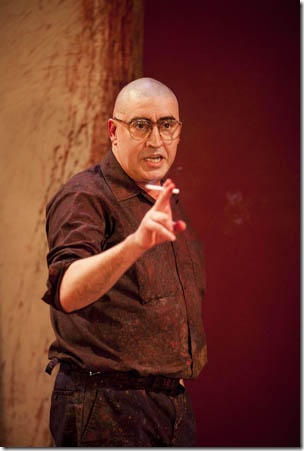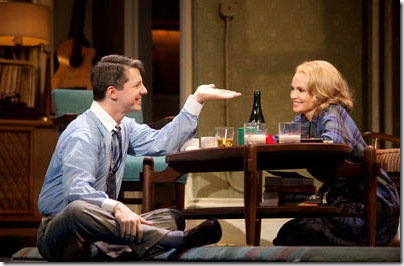Oh, the sacrifices I make for you, my readers.
I am currently in New York City, enduring a week of theater, to fill you in on the season here, either as a guide for your future visits to Broadway or to whet your appetites for potential touring editions to South Florida. Or, OK, just because I craved an immersion into good theater for my own sake.
So I will be seeing 10 shows in seven days and, if the WiFi holds out, posting daily dispatches from Manhattan, with more detailed reviews to come after my trip.
I arrived Saturday, a great sunny day with a crispness in the air that is so rare in Florida. My theatergoing began on a high note with a matinee of the play Red, a portrait of the work process and artistic esthetic of obsessive, angry abstract expressionist painter Mark Rothko. The production is a transfer from London’s Donmar Warehouse, but is written by American John Logan, best known for such screenplays as Gladiator, The Aviator and Sweeney Todd.
The play looks at Rothko in the late 1950s, as he is readying a set of huge canvases commissioned by New York’s Seagram’s Building for its then-new Four Seasons restaurant. He mentors, instructs and verbally abuses his new assistant, spewing out his artistic philosophy along with his contempt for some of his fellow artists and his unappreciative clients.
Rothko is played with a fury by Alfred Molina, paired with Eddie Redmayne, who won the Olivier Award for his performance. The production is compact, full of heady ideas and a passion about the art of making art. Expect it to receive several Tony Award nominations.
I attended with Charles Passy, my former colleague on The Palm Beach Post, the restaurant critic who has just begun a new job covering the world of wealth management for The Wall Street Journal. Fortunately, he has kept his eye open for good places to eat and he introduced me to John’s Shanghai, a terrific Chinese place in the theater district. Try the soup-filled buns.
In the evening, I saw the final press preview of Promises, Promises, a musical from 1968 based on Billy Wilder’s sardonic comedy, The Apartment. It is a show I have always liked and I have held a grudge for the past 42 years that it lost the Best Musical Tony to 1776. It has a very enjoyable score by Burt Bacharach and Hal David, their only foray into the musical theater, reportedly because Bacharach felt unable to control the sound in the theater like he could in a recording studio. He was disgruntled that performances of his songs would change night to night, which is exactly the essence of live theater.
I suppose you could complain that the score sounds dated, having that ‘60s sound that typified what Bacharach churned out for his pop songs of the era, but it was a pleasure to hear it again in this first-ever Broadway revival.
Not everything in the production works, including the casting of Kristin Chenoweth as the female lead, stuck in an affair with a married executive at the life insurance company where she toils. The character needs to be vulnerable and a quart low in the self-esteem department, where Chenoweth comes on like her usual force-of-nature self. To bolster her role, two pop songs — I Say a Little Prayer and A House Is Not a Home — have been added for her. Both are terrific songs, but neither one fits her character or the dramatic situation snugly.
Making his Broadway debut is Will and Grace’s Sean Hayes as Chuck Baxter, the likeable, ambitious schnook who lends his apartment out to libidinous executives for extramarital quickies. He suffers by comparison to Jerry Orbach, who originated the role, but I suspect most of today’s theater critics — or audience members — do not go back that far. Hayes has a pleasantly musical singing voice and an amusing way with physical comedy. He is the best thing about the production.
Also looming over the show are memories of the great Michael Bennett’s original choreography, including an explosive dance number at the company’s Christmas party, set to some of David’s dumber lyrics, Turkey Lurkey Time. The original number, danced by a trio that included a young, agile Donna McKechnie, is classic. The new version, with steps by Rob Ashford, barely raises the ambient temperature.
Next: Another acclaimed play from London about a U.S. subject: Enron

